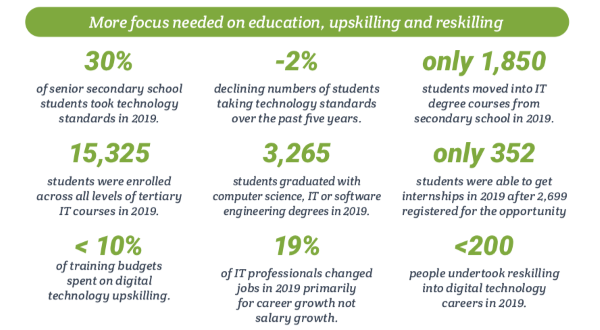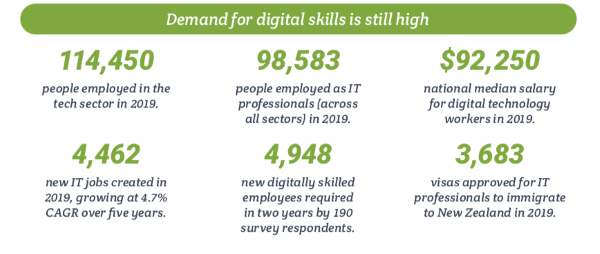Published on the 03/02/2021 | Written by Heather Wright

Digital Skills report lays bare Kiwi skills mismatch…
It’s one of the fastest growing parts of the New Zealand economy, with a myriad of different facets and good pay, but New Zealand’s digital sector is failing to attract and develop local talent – and it’s hurting the wider economy.
It’s hardly surprising news, with skills issues the talk of the sector for many years. But the new Digital Skills Aotearoa survey, published by the Digital Skills Forum, paints a sombre – 110 page – picture of lost opportunities, with New Zealand experiencing a digital skills mismatch which is impacting on the growth of the economy, particularly during difficult Covid times.
“More focus, collaboration and investment is essential now.”
At its heart the report’s key message is simple: There is a dramatic skills mismatch – not shortage – with not enough New Zealanders available with the right digital skills.
Broken down, younger students aren’t interest in technology and ‘pathway’ subjects like maths. There’s a scarcity of teachers with IT skills. Enrolments in tertiary IT education are flatlining, or declining. There’s a lack of diversity with low female, Māori and Pacific Island participation in tech. Companies aren’t investing in in-house development of IT staff, and less than 10 percent of corporate training budgets are spent on digital tech upskilling. And there’s that old chestnut: Employers look offshore for talent – an option now fraught with complexity, and additional expense, given current border closures.
While most of that’s not news for most of us, the Digital Skills Aotearoa Digital Skills for our Digital Future survey provides the figures behind the headline grabs. From the 114,450 people employed in the tech sector in 2019, the 98,583 IT professionals employed and the $92,250 national median salary for digital tech workers, to the 4,462 new jobs created in 2019, the 3,265 students graduating from tertiary IT courses and the 3,683 visas approved for IT professionals migrating here.
Then there’s the fact that only 352 of students were able to get internships in 2019 after 2,699 registered for the opportunity, and that just 30 percent of senior secondary school students took technology standards that year.
Graeme Muller, Digital Skills Forum member and NZTech chief executive, says the survey shows system wide challenges that require urgent national attention.
“Research shows a lack of coordinated effort, an industry reporting dramatic skills challenges driving a heavy reliance on immigration, while under investing in the development of its own workforce.”
The report is an update to NZ Tech’s 2017 digital skills research and includes new sections examining the eduction to employment landscape and detailed analysis of data from the Summer of Tech internship programme.
The findings will be used to help inform the skills workstream within the Digital Technology Industry Transformation Plan (ITP) and form new initiatives, co-designed by government and industry to trial ways of bridging the education to employment pathway in an attempt to lift New Zealand’s high growth digital sector and provide the workers it needs while providing Kiwis with high value jobs.
The report says immigration has become the preferred pathway for recruiting for digital technology roles, with the majority of roles being recruited for senior or experienced staff, with very few entry level positions available.
“This indicates a skills shortage for senior experienced capabilities and an oversupply of under-skilled graduates,” Muller says.
“The implications of the Covid pandemic have heightened the role of technology in all our lives and have, for the medium term at least, diminished our ability to continue to import talent from overseas.”
Churn in the sector is also high, at 19 percent – something the report attributes in part to that lack of upskilling investment by companies.
If the key message of the report, that New Zealand doesn’t have enough people with the right digital skills, is simple, the solutions offered by the report are less so. While individually each of the recommendations appears straightforward, they require a complex interplay of industry integration and partnership with education and work at all stages of the digital skills pipeline.
The report recommends building the digital skills pipeline through promotion of digital technology to students, parents and whanau, increased investment in educators confidence and upskilling, the development of clearer pathways into digital roles and working with women, Māori and Pasifika communities to improve participation.
Developing consistent data for workforce planning and creating and deploying targeted international talent attraction are also recommended.
Supporting the transition to work, with a national education to employment and workforce planning platform, digital apprenticeship pathways, simplified and expanded internship grants and an expansion of the GovtTechTalent graduate programme, is recommended.
When it comes to upskilling and reskilling, the funding and coordination of specialisations across ICT graduate schools, is advocated, along with encouraging industry accreditation and recognising and incentivising industry certifications.
“It’s vitally important that New Zealand continues to attract the best digital talent the world has to offer, bringing new ideas and market connections into the local New Zealand workforce.
“However, more focus, collaboration and investment is essential now to build a strong pipeline of talent to support the transition from education to digital technology careers and to help those already working to upskill or reskill with in demand digital skills.”
Of course, it’s not the first time we’ve heard the call for more focus on building a vibrant pipeline of skills. The 2017 report called for every child to be exposed to digital technology pathways. Three years on, and there’s decreasing participation in digital technology in education and a less diverse workforce.
This time, there’s hope that the use of the survey to inform the work of the Digital Technologies ITP might mean tangible action.
Says Muller: “The challenge in 2021 is less around the depth of the pipeline but how we can better match digital skills with the organisations that need them. These companies and government organisations must invest in their digital talent from entry level, right through to senior level roles.
“The Covid issues has been a huge challenge for New Zealand. The next test is economic recovery, especially after the largest fall in GDP in the country’s history.
“Just as technology is critical in fighting Covid, it will be equally vital as all Kiwis work to rebuild. A digitally-skilled workforce and innovative home-grown businesses can help create jobs, improve services, tackle social challenges and power our economic growth in the years ahead. But only if we make the right decisions and investments today.”





























